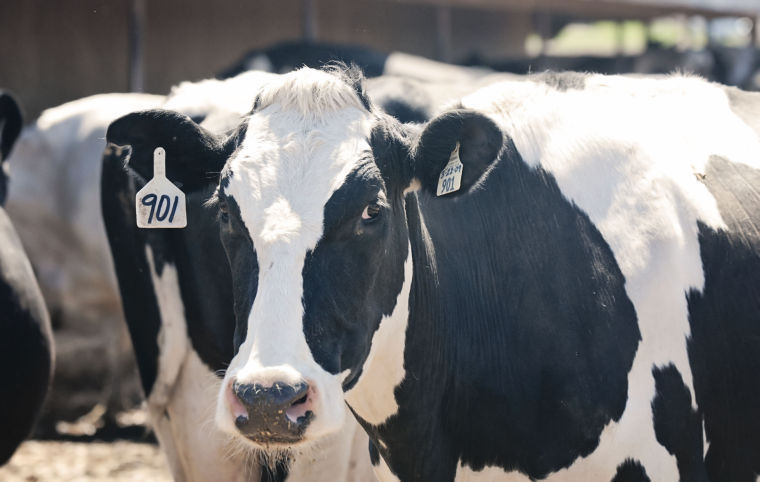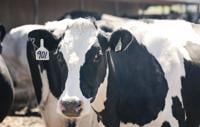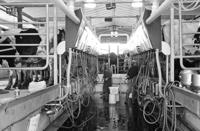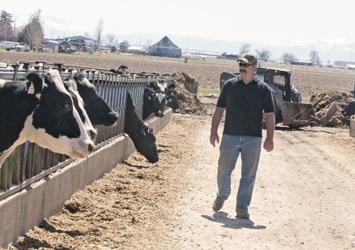At her home in Logan, Kymberlee Lawrence, like most Cache Valley residents, enjoys an occasional tall glass of milk. But though her milk is white, frothy, and nearly identical to the milk for sale at the local grocery store, Lawrence’s milk is quite different than what most people consume because it hasn’t been pasteurized.
Lawrence believes raw milk is healthier than pasteurized milk and wishes she could legally buy it in Cache Valley, but studies done by The Centers for Disease Control and Prevention, or CDC, show that human consumption of raw milk is highly dangerous and can lead to illness and even death.
Raw vs. Pasteurized:
Pros and Cons
Pasteurization was discovered by French chemist and microbiologist Louis Pasteur in 1862, and has been used routinely to sanitize milk in the United States since the 1920s. Pasteurization involves heating milk to a high temperature for a short period of time, which kills disease-causing bacteria.
Proponents of raw milk claim the pasteurization process also kills health promoting bacteria, breaks down enzymes, and results in a less nutritious product. Many people with food intolerances and allergies are able to tolerate raw milk better than pasteurized.
In fact, Bob Ropelato, who runs a dairy in Ogden, began selling certified raw milk in order to be able to legally provide the product to friends with health problems. A friend with stomach cancer drank Ropelato’s raw milk and, while it didn’t prolong his life or cure him, it allowed him to be more comfortable. Ropelato has also heard from his customers that raw milk has helped with Crohn’s disease.
Ropelato also sells pasteurized milk, so he said he doesn’t care which milk his customers buy, as long as they’re purchasing from him. Raw milk sales are profitable, Ropelato said, but that’s not why he does it.
“In ag, you’re never going to be really rich,” he said. “It’s just neat to help people, they really appreciate it.”
Lawrence began drinking raw milk about a month ago, and now, she said she’s hooked on it. Raw milk just made more sense to her, she said.
“I don’t boil my breast milk before I feed it to my baby.”
Since she began drinking raw milk, Lawrence said, she’s noticed an improvement in her allergies and complexion.
Michelle King, a Logan resident, began buying raw milk for her family in 2011 in attempt to fortify her children’s teeth and bones. Her children have multiple food intolerances, and couldn’t drink pasteurized milk.
The benefits, King said, are clear. In 2012, no one in her family got sick, and while she doesn’t know if that’s related to raw milk, it was unusual.
In addition she said, it “tastes better than any other milk you’ve ever had.”
While many believe raw milk is superior to its pasteurized counterpart, the Centers for Disease Control and Prevention, or CDC, strongly discourages the human consumption of raw milk and products made from it. Raw milk does contain beneficial bacteria, but the risk of getting sick from harmful bacteria, including campylobacter, salmonella, E. coli, and listeria, is great. Beneficial bacteria can be consumed through yogurt, according to the CDC website, which is much safer.
Even if you get milk from a very clean dairy, the only way to avoid contamination, according to the CDC, is pasteurization. Milk can become contaminated from cow feces, an undetected infection of a cow’s udder, cow disease, bacteria that live on the skin of cows, the processing equipment, insects, rodents and other animals, and human cross contamination. Pasteurization is necessary for the same reasons that meat should be cooked thoroughly, the website reads.
According to foodsafety.gov, raw milk “does not kill dangerous pathogens by itself, pasteurizing milk does not cause lactose intolerance and allergic reactions, (and) pasteurization does not reduce milk’s nutritional value.”
Richard Clark, director of the Division of Regulatory Services within the Utah Department of Agriculture and Food, said, “Raw milk is the perfect food. Humans and mammals have survived on it for centuries ... but it’s also perfect for pathogens.”
He explained that before the advent of pasteurization, everyone drank raw milk, but they typically consumed it within a few hours and only a few miles away from the source. Disease outbreaks tied to milk became a huge problem when milk began to be transported long distances.
Mark Gibbons, owner of Gibbons Brothers Dairy in Lewiston and president of the Utah Dairy Producers Association, said raw milk is more popular now because of a popular movement to get back to less-processed, more natural foods.
“(It) has to do with feelings,” he said. “People feel good about doing something they feel is more natural.”
Clark said the problem with this thinking is that people can’t relate to the way the dairy industry was 100 years ago.
“Milk is now one of the safest foods in the United States, when it was one of the most dangerous.”
The CDC reported that between 1998 and 2008, raw milk was responsible for 2,384 illnesses, 284 hospitalizations and two deaths, but that many unreported incidences could mean the numbers are much larger. During the same period, the CDC reported 277 poultry related deaths and 237 deaths from vegetables.
The CDC also reported that approximately 3 percent of the American population drinks raw milk. Clark said this information is key to understanding the statistics about the dangers of raw milk. Unpasteurized milk doesn’t make a large number of people sick, he said, because most people don’t drink it. Clark estimates that nearly 100 percent of the population consumes vegetables, explaining the much higher number of deaths. If everyone consumed raw milk, he said, the death rate “would be astronomical.”
Lawrence, and many other raw milk advocates, concluded that raw milk is reported to be much more dangerous than it is.
“I’m willing to take the risk because I think it’s not that big of a risk,” she said.
She also said she thought it was interesting that according to the Food and Drug Administration, aspartame, artificial colors and pesticides are safe, but raw milk isn’t.
Ironically, Lawrence pointed out, most dairy producers and their families drink their own unpasteurized milk. Gibbons and Ropelato both admitted they do.
Utah Department of Agriculture and Food Deputy Commissioner Kyle Stephens, who also grew up drinking raw milk, said those who grow up on a farm develop an immune system to cope with the bacteria in raw milk, but those removed from the farm are more susceptible.
Alan Young, a dairy specialist with the Utah Cooperative Extension Service, compared drinking raw milk to playing Russian roulette.
“(Getting sick) does happen — not all the time though,” he said. “You could be drinking it every day, but one bad batch could make you really, really sick.”
Those particularly susceptible to becoming ill from raw milk, Clark said, are small children and the elderly, and it is those parties that regulation especially seeks to protect. Many advocates argue that as informed adults, they should be allowed to consume raw milk, and get sick from it if they choose, but Clark described this perspective as “egocentric.”
Gibbons said the safeguards exist in order to protect the public and the industry. He explained that the dairy industry has come a long way to establish milk as a safe product, and when there’s an outbreak caused by raw milk, “It gives the whole industry kind of a black eye.”
Data from the CDC and state health departments show that raw milk and Mexican-style queso fresco soft cheeses (which are usually made from raw milk) caused almost 70 percent of the reported outbreaks of foodborne disease in dairy products. If pasteurized milk was as risky as raw milk, the website states, the outbreak numbers in pasteurized products should make up a much higher percentage of outbreaks, since a greater percentage of the population consumes them.
While raw milk advocates maintain that raw milk has many benefits that outweigh the potential risks, experts say the science doesn’t back up these claims.
“Science has proven that the nutrients and the value in raw milk are still there after pasteurization,” Gibbons said. When processed milk is fortified with vitamin D and other additives, Gibbons said, it’s a much superior product to raw milk.
“The sources cited by people who feel (raw milk is superior) are sources with no scientific credibility,” Clark said. “They tend to be scientific looking treatises ... that eloquently portray a point of view. ... There’s nothing we’re aware of to support that point of view.”
Raw Milk Regulations in Utah
According to the Food and Drug Administration, or FDA, 20 states ban the sale of raw milk outright, while the remaining states allow it on a limited basis. The FDA does not have the authority to regulate intrastate raw milk sales, but it did ban interstate raw milk sales in 1987.
Utah currently allows legal raw milk sales. Throughout the state, raw milk can be sold legally by a licensed raw milk producer at a retail site owned by the producer. People who own cows can legally consume their own milk, but can’t sell it legally or even give it away without a license.
Ropelato is the closest licensed raw milk producer to Cache Valley. His milk is sold at his store, Johnny’s Dairy, and delivered to Bingham’s Whole Health store in Tremonton. The regulations imposed on the sale of raw milk are very strict, Ropelato said, and include regular testing of his product to ensure that it is as safe as unpasteurized milk possibly can be. The standards Utah imposes on raw milk are equivalent to national standards for pasteurized milk.
Still, Clark said, “Utah is one of the most raw milk accessible states in the country.”
During the last legislative session, Clark said, the Utah Legislature made changes to reduce overhead costs for legal raw milk producers, making certification even easier.
But for raw milk enthusiasts, like Lawrence, Tremonton is too far to go for legal raw milk, and the certification process appears to be prohibitive for Cache Valley dairy farmers.
Many dairymen in Cache Valley and across the state have avoided certification by secretively, and illegally, selling their raw milk. Milk buyers often pick up milk only at specific times, under the cover of darkness, in order to avoid detection.
“Raw milk is probably harder to get than prescription drugs,” Lawrence said.
The reasons dairy farmers sell milk illegally vary widely. Ropelato suggested that some dairymen might sell raw milk “under the table” because if their milk causes illness, it’s unlikely that it will be reported or traced to them. If Ropelato’s milk causes an outbreak of illness, however, he will be inspected more heavily and the outbreak will be reported in the media.
Gibbons theorized that Cache Valley farmers don’t get certification to sell raw milk because of the cost involved, and because the market for raw milk wouldn’t support the production.
Young and Clark both said certification isn’t difficult or cost prohibitive for a Grade A dairy that already produces milk for pasteurization. Stephens doesn’t know why a Cache Valley dairy hasn’t taken the initiative to get certification — to meet the needs of those who want raw milk in this area.
However, many dairy producers won’t touch raw milk, said UDAF Milk and Dairy Program Director Cody Huft. They just don’t want to take the risk of making someone sick.
“If people want to drink raw milk, that’s their business,” Gibbons said, “but they need to do it legally, and there are avenues to do that legally.”
Lawrence and King believe the regulations for legally obtaining raw milk in Cache Valley are too strict. Both women are members of a Facebook group called “Cache Raw Milk Advocates,” which has been working to encourage legislative changes for raw milk restrictions in 2014.
King believes getting milk legally from Tremonton is more dangerous than obtaining it illegally in Cache Valley, since the milk has been transported from a dairy even further away and is not refrigerated during her drive back to Logan. She also believes the government regulations aren’t necessary.
“Me consuming milk doesn’t hurt anyone else,” she said. “Laws should protect us from each other.”
King, along with other advocates on Facebook, stressed that the issue wasn’t raw milk, necessarily, but her right to choose what she consumes, rather than being forced by the government to eat what’s “legal.”
King and other group members have reached out to House 5 Rep. Curt Webb to make their concerns known. According to the Facebook page, Webb will draft a bill to loosen the raw milk regulation, but a phone conversation with him revealed that Webb has had a change of heart on the subject.
“I was led to believe the state (government) was depriving them of the opportunity (to purchase raw milk),” Webb said.
After researching the matter, he said, “I have to admit that unless there’s something I’m missing, I was wrong. ... I don’t think the government regulations on this are unrealistic. The state has taken a reasonable approach.”
Not being able to obtain raw milk legally in Cache Valley is due to the fact that no farmer has chosen to provide it, Webb said, and not because of government regulations.
Farmers’ Stances
Raw milk is a divisive issue not only among state residents and their respective governments, but also among milk producers themselves. During their annual meetings earlier this year, the American Farm Bureau and the National Farmers Union, who both claim to represent the American Farmer, issued opposite statements concerning the sales of raw milk.
The National Farmers Union endorsed a pro-raw milk stance during their national convention in March, even going so far as to endorse the interstate shipment of raw milk. The policy supports the sale of raw milk because “it provides a viable market niche for dairies” in a difficult economic climate.
The American Farm Bureau delegates, during its annual meeting in January, on the other hand, approved a policy stating that only pasteurized milk and milk products should be sold for human consumption, citing risks to public health as the reason.
Gibbons said he thinks farmers are generally against the sale of raw milk, but was surprised to learn that the American Farm Bureau had come out entirely against its sale. Gibbons said he believed the Utah Farm Bureau had recently issued a statement in favor of raw milk. The differences of opinions arise because of the vast differences in sizes and natures of dairy farms, he said.
The Future
Utah raw milk regulations attempt to please both pro- and anti-raw milk factions, by allowing, but strictly regulating, the sale of raw milk. Young and Gibbons said the state has reached a happy medium.
“The way we’re handling it is as good as you can get,” Young said. “This is a way to keep it all above board but still maintain some semblance of safety.”
Ropelato disagreed, and said that the regulation in Utah is still too strict. He compared drinking raw milk to smoking, a dangerous activity that is still legal for adults who choose to participate in it. Ropelato hopes the government will be more open-minded in the future and allow dairies to provide raw milk with less stringent certification measures.
King admits that her opinions on food regulation are radical, but she’d like to see private industry take over the regulation of food without government intervention.
“We need to put the responsibility back on the market and on the people,” she said.
———

















(36) comments
I grew up on a Grade A dairy farm, and also worked on a university dairy while attending college. No way I'm drinking raw milk. (But I would never try to prevent someone else from choosing raw milk.)
I am in the process of completing the licensing process to sell raw goat milk in Idaho. I am not familiar with how the Utah regulations compare but in Idaho there is testing that has to be done before even applying for a license and then repeated annually after licensing. The are also regular inspections and testing of the milk and checking the proper storage temperatures are achieved. The milk is also tested for the presence of drugs. The size of the herd is also limited to be only 3 cows or in my case 7 goats, thus limiting the volume of milk that can be sold under the license. This alone prevents the possibility of any significant outbreak or risk to public health should something go wrong. Worst case only a few people could be affected.
One thing in the studies mentioned from the CDC fail to indicate is whether the milk that caused problems was sold by licensed or regulated dairies versus other sources. I would be curious to know the actual source for the 2 deaths attributed to raw milk. In the article, Mr. Gibbons mentioned that there was some concern that illness caused by raw milk gives the whole industry a black eye. The same could be said for licensed raw milk dairies.
I think it says something about the character of those seeking more legal avenues for raw milk that they want to do this through local legal methods rather than simply buying it illegally.
I recognize that there are strong feelings on both sides of the issue. I have lived just long enough to know that making or chaining laws and regulations rarely change how people feel about an issue, in fact it only seems to intensify them. In my opinion the best route here is to inform the public and let them make their own choices.
When there were small farms of 30 or so cows and the farmer new their name and their health , maybe.. But now that cows just number 398 and the guy milking her can't speak English , maybe not...
And the facts being given by a government employee needing to keep a job, well maybe not..
Let's see here...I can buy a single ice cold beer at a thousand different gas stations(to transport home to drink of course) but I cant buy raw milk! I guess it's because alcohol has no ill effects! this is so screwed up!
I favor people being able to buy raw milk if that's their choice, but to make the comparison you've made and draw the conclusion you've drawn strikes me as bizarre. Many substances and activities can be harmful if abused/used in excess - salty, fatty foods, sugary drinks, etc.
Oh my goodness. Raw milk is illegal. And there are bovine bootleggers among us! Prohibition of raw milk that has a small chance of making you sick. What next, parents who let their children eat raw cookie dough with eggs in it get jail time for child endangerment?
Tobacco is okay, as long as you know you will probably die because of it
. Alcohol is fine, we could use a few more people with a few less brain cells...
but RAW MILK!!! Oh The Humanity! make it stop!!!
You forgot the peeling off the meat of uncooked bacon strips and munching on the ambrosia of pork.
Yummy-yum.
Although no longer a carnivore, such recognized and needless risks would still be my responsibility and I would probably write a "duh" in the commentary section of the article reporting of my admittance into the hospital, as I would do yours as imbibing raw milk and any smoker who shockingly claims they were entrapped into cigarette-smoking.
The jail-time and child endangerment comment was just plain stupid.
Duh.
Very good article. Both sides of the issue regarding raw milk are presented, as it should be, in any news article presented publicly.
Drinking raw milk should be considered an individual choice, from one who accepts full responsibility for any consequences, provided that the choices, and consequences are clearly presented.
Having spent a good part of my teen years working on a dairy farm, I thought it might be fun to take a sample of raw milk to school and put it in a centrifuge we had for separating out blood plasma. Then I got a plate of sterile agar and put on a few droplets from the bottom of the vials, covered it and put it away, checking after a few days.
I don't drink raw milk. Never will.
No, I didn't do gram stains or morphology to determine the species. I had seen enough.
Um, DL, you could get similar results from just about anything in your fridge. I guess you knew that, didn't you?
I suspect you'd see similar results from pasteurized milk. Ever see an unopened spoiled bottle of milk?
I neglected to mention the debris, which was the purpose of using the centrifuge.
Collected milk is put through a cheesecloth, which (ideally) removes manure, hair, or other particulate which could be generated from the cow and make its way in.
Generally the residual debris is resultant from the lack of homogenization, and is protein or fatty-acid precipitation.
I don't think it's any of my business or your business if someone chooses to drink this or that liquid as long as they, and not I, bear the cost of their actions.
Something else to keep in mind is that most studies can only be correlational and not causal. Many of the reports of raw milk illnesses cannot verify that raw milk was actually the cause of the sickness.
Everyone likes to discount anectodal stories because they can't be proven. But they can't be disproven either and they should not be ignored. I have two boys who get diarrhea and/or skin problems every time they consume pasteurized milk. And yet they can consume raw milk, in small portions, without reaction. They both have weak teeth (where my nonallergic daughter does not). Despite all of our efforts, supplementation, and tooth brushing, nothing has helped. I have no proof that raw milk was either helping their teeth and bones or not. I am just a mom trying to do everything I can to help my boys. All I want is the option to make that choice.
Something to keep in mind also, is that studies show trends as a whole and not individual cases. People and their bodies are very individual and while studies of populations are very helpful, they often cannot be applied to individuals. A very interesting video that mentions this can be found here. http://www.ted.com/talks/eric_dishman_health_care_should_be_a_team_sport.html
Thanks for the link, but I don't generally make health care decisions for myself and my family based on TED talks from a man who has a bachelor of arts in speech and drama. He puts on a good speech (show), but I'll stick to taking health advice from those with actual medical degrees.
"Their choice.
Their risk.
Their responsibility."
That's all I ask.
I'm fine with that.
Your health Insurance premiums should be adjusted to reflect the additional risks.
The health insurance czars may not allow that.
http://www.nationalreview.com/articles/345153/smoking-preexisting-condition-kevin-d-williamson?pg=1
Thanks for the link.
I disagree with the idea that smoking is a preexisting condition. Smoking is a choice which has medical consequences that should be borne by the smoker and not the rest of society.
Nanny-state orion surprises me here.
Those who want to drink raw milk should sign a waiver that they take on all risks and liability. They should also sign a contract that they will assume all medical costs associated with drinking raw milk and not allow insurance companies to cover their risk an freedom of drinking pathogens.
Same goes for anyone that smokes, buys Ice cold beers at chevron( to drink at home of course) and anyone eating at Mc donalds, and anyone that ventures into the outdoors to enjoy a moderate to low risk activity?
I agree completely that it is their risk. But you all know that as soon as someone loses their life because of drinking raw milk that law suits will be all over the place. That isn't cheap as generally those legal and medical costs get passed on to everyone one way or another.
agreed
I'm with orion. Their choice, their responsibility. In this case especially, because it doesn't hurt me if their kid gets sick and is hospitalized after drinking contaminated milk. It's sad of course, but their right as parents.
I do find it amusing that the information provided by proponents is heavy on "facts" like:
"I didn't get sick last year" and "I don't boil my breast milk"....while actual peer reviewed scientific studies don't support those claims.
I had an economics professor who called the lottery a tax on people who can't do math. Maybe this is some sort of health tax on people who are blind to science?
If we all owned our own cows and milked them ourselves, I'd probably drink raw milk too. The fact is, these days the milk is mass produced, handled by many, stored, transported, packaged and put out for sale - which is a long list of opportunities for contamination. I'm not interested in taking the risks, but if others want to - good luck to them!
Just because those were the few sentences out of a few entire interviews the writer chose to use doesn't mean there are not studies supporting the benefits and proving the safety of raw milk doesn't mean that there aren't any, or that people don't know about them. Many of the studies out there claiming the dangers of raw milk are also either not peer reviewed, and are certainly not without bias. Look beyond the CDC website. There is more to the story.
I encourage all those in favor of raw milk to go and tour a few local dairy farms. Don't just go to the pristine farm or two, but go to just your average dairy farm. Dairy farmers work extremely hard and do all they can to be clean, but there are numerous ways that milk can be contaminated. That isn't a knock in the dairymen as they are great. But just watching the milk machines hook onto the source is enough to realize there could be contamination issues.
Most people don't get milk (or want to get milk) from the average commercial dairy farm. Most people I know who have drank it have walked through the farms and examined the process from the farm they actually get it from. Something I think they all should do before drinking it. I challenge you to walk through the entire process of how pasteurized milk, spinach, hamburger, and every other food gets from the source to your table. You will probably be equally grossed out. You pick your poison and I'll pick mine.
Ever sucked it straight from the source?
And risk getting smacked in the face by a cow's tail? Are you kidding?
My parents bought raw and unhomogenized milk way back when they would go to the local farm about a mile away. The dairyman used to bottle and sell it at his dairy. The place was clean and always had that wonderful smell of pure, clean milk. I still remember the thick layer of cream at the top of the bottles my dad used to claim for himself.
I've heard today's super-market milk described as 'dead milk.' The fresh dairy smell I remember certainly is no longer an element of the bottle I open and the glass I pour today. I understand the idea of those wishing to purchase local food products. I enjoy the farmer's market as much as any.
However, considering the proliferation of today's possible pathogens and risks in raw milk, it seems rather foolhardy for the freedom crowd to default over safety concerns.
With that said, until it affects the rest of us directly:
Their choice.
Their risk.
Their responsibility.
I suspect there's more to it than that.
The cost of milk is subsidized by the government. The only farmed and commercially sold product regulated more than milk is marijuana.
Ridiculous.
Ms. Lawrence, you don't pasteurize your own milk because you're feeding another human being and there isn't any equipment that can invite pathogens to enter the milk.
And Ms. King makes the paper again---I think she likes being front and center. Ms. King, your last quote is ridiculous. You lose all credibility with a statement like that.
It's always interesting finding out that there are a few radical nut jobs out there who know more than 125 years of research and experience. The more we move forward as a society the more some want to go backwards.
Ms. King is in the paper a lot because unlike most of us here, she doesn't limit her involvement in local issues to commenting on hjnews.com under a pseudonym.
While I don't agree with her on this particular issue, I have a lot of respect for her and others in our community who are willing to get involved far beyond armchair quarterback status.
And for the record, I will defend her right to drink and buy all the unpasteurized milk she wants. As long as I don't have to drink it.
Keep up the good work Ms King![smile]
Welcome to the discussion.
Log In
We welcome comments, however there are some guidelines:
Keep it Clean: Please avoid obscene, vulgar, lewd, racist or sexual language. Don't Threaten: Threats of harming another person will not be tolerated. Be Truthful: Don't lie about anyone or anything. Be Nice: No racism, sexism or any sort of -ism that is degrading. Be Proactive: Report abusive posts and don’t engage with trolls. Share with Us: Tell us your personal accounts and the history behind articles.